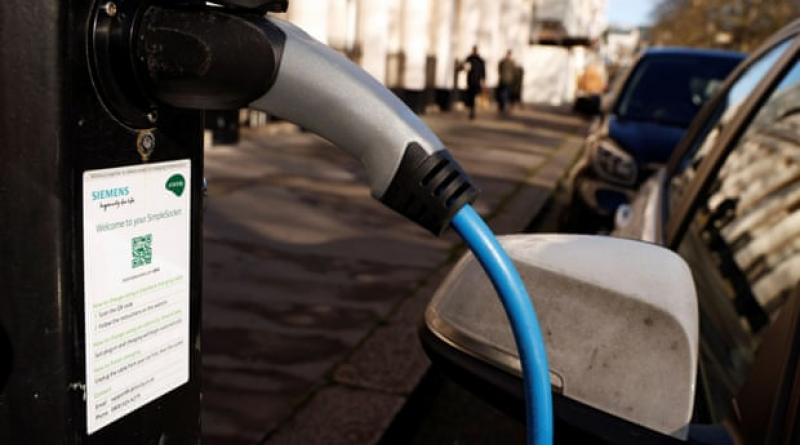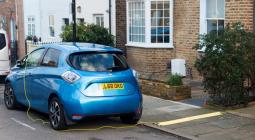Make oil firms install electric car chargers in petrol stations, says thinktank.

Proposals to accelerate electric car rollout also call for grants towards buying secondhand electric vehicles.
Oil companies should be required to install rapid chargers for electric cars in all their petrol stations above a certain size by 2023 in order to speed up the rollout of vehicles with zero tailpipe emissions, according to thinktank Bright Blue.
Bright Blue’s report also calls for a reversal in cuts to government grants for battery electric vehicles (BEVs), a new grant to help low income households buy secondhand BEVs, and for the lower lifetime costs of BEVs compared with those of petrol and diesel cars to be made clear at the point of sale.
The transport sector is the UK’s largest emitter of carbon dioxide, responsible for almost 28% of emissions in 2018, but unlike other sectors has made minimal reductions in recent years. Cars cause over half of the emissions. The government has announced an end to sales of petrol and diesel cars in 2030 to help tackle the climate crisis.
Ministers have committed to BEV grants until 2023 but Bright Blue said they should be front-loaded, rising to £5,000 from today’s £3,000. To encourage purchases, the grants would then taper down to zero in 2023, when the prices of BEVs are expected to match those of conventional cars due to falling battery costs.
The grant for used BEVs should be £2,000, the thinktank said, and such schemes already exist in the Netherlands and France. People say upfront cost is the main barrier to buying BEVs, according to polling. A cut in the subsidy level was blamed in 2019 for a fall in sales.
“In 2020, 6.6% of new UK vehicle sales were BEVs. Those figures are going to need to increase dramatically within nine years, if we’re going to meet the petrol and diesel phase-out by 2030,” said Patrick Hall at Bright Blue.
Hall said rapid chargers away from motorways were currently rare. Requiring oil companies to install at least three at each petrol station would help tackle the fear drivers have of not being able to recharge their cars on longer journeys, he said, adding that the government could pay for the necessary grid connections through the existing £950m Rapid Charging Fund.
Shell, which has 1,000 petrol stations in the UK, has almost 100 rapid chargers on its forecourts and aims to have 200 by the end of 2021. “Whether at home, at work or on-the-go, we want to provide our customers with accessible and affordable EV charging options,” said István Kapitány, at Shell Global Mobility.
The Bright Blue report also recommends introducing an obligation on all local authorities to install on-street BEV chargers within three months when requested by residents. “You would end up getting chargepoints in places where they are needed and going to be utilised – it’s a targeted chargepoint rollout,” said Hall.
On Tuesday, the government announced a £20m extension to its on-street residential chargepoint scheme, which could fund 4,000 more chargepoints. The same day, another thinktank, Policy Exchange, said installations needed to increase from 7,000 to 35,000 points a year to meet the 2030 deadline for the end of sales of fossil fuel-powered cars.
Other policies proposed by Bright Blue include making the interoperability of different charging networks a condition for central and local government funding, as already is the case in Germany and California. Hall said this would allow drivers to roam easily between different networks in the same way as mobile phone users.
Another policy proposal is to immediately mandate that all new vehicles bought by central and local government must be BEVs. There are approximately 75,000 vehicles in the public fleet.
A spokesperson for the Department for Transport said: “This government is going further and faster than ever before to decarbonise transport and to end the UK’s contribution to climate change by 2050. Our £2.8bn strategy is powering the electric transition to incentivise drivers and create a cleaner, greener transport system for all.”
4 February 2021
The Guardian




